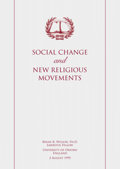It is a general characteristic of established religions to emphasize their antiquity. This claim is intimately associated with the belief that there are abiding truths, eternal verities, and the vague but powerful idea that authentic wisdom comes from some unspecified primordial past. At the same time, there is a widespread awareness of the relentlessness in many aspects of social life of irrevocable change. When the economic and industrial order is undergoing such rapid and perceptible change, when social structure is manifesting a constant process of re-adaptation, when major social institutions—the polity, the law, education, recreation, and even the family—are all experiencing both constant unconscious adjustment and programmes of conscious reform, it would be extraordinary were religious ideas and organizations not to be undergoing similar processes of change and innovation. This they do, the premium on antiquity and tradition notwithstanding. Yet, so embedded is the assumption that religion should be, as liturgy puts it, “as it was in the beginning, is now, and forever more shall be” that the agents of other social institutions find it difficult to come to terms with the idea of new religions or the innovative procedures which those religions promote. Law officers work with out-worn definitions, established by case law extending into the remote past, so that even the legal conception of what might constitute religion is confused and obsolete. Politicians, sensitive to public disquiet when for any reason new religions are attacked in the mass media, readily invoke conventional and established assumptions about the nature of religion. Journalists play on these widely diffused traditional conceptions when, intermittently, religious issues can be elevated into matters of wider public concern. The religious establishment itself, despite endeavours to bring their own religious performances “up to date”, generally view with suspicion any innovative developments that occur outside the confines of the churches. In a rapidly changing world, in which social institutions are all in flux, to religion alone is ascribed a continuing and theoretically unchanging role, function and form.
Yet the evidence is that considerable numbers of people are seeking, and finding, new patterns of religious practice and new conceptions of religious truth, engaging in new spiritual quests, and participating in new types of religious organization.
Yet the evidence is that considerable numbers of people are seeking, and finding, new patterns of religious practice and new conceptions of religious truth, engaging in new spiritual quests, and participating in new types of religious organization. Although many of the major agents of public opinion and influence are still wedded to the ancient stereotype of religion, opposition to new religious movements largely because they are new is tantamount to resistance to the very process of social and religious evolution itself.
Bryan Ronald Wilson
August 2, 1995
Oxford, England





























